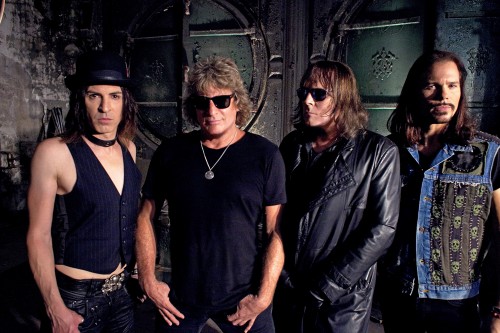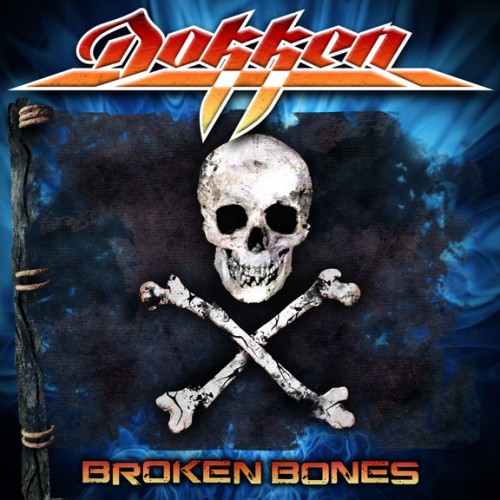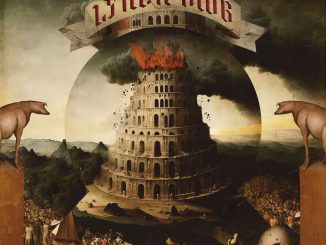by Deb Rao
– Senior Columnist —
One band that helped define the metal genre is DOKKEN. The band has recently released their latest CD BROKEN BONES on Frontiers Records. In this Exclusive interview for Hardrock Haven, DOKKEN guitar virtuoso JON LEVIN has checked in with Hardrock Haven to discuss BROKEN BONES.

Hardrock Haven: Jon, the new DOKKEN album Broken Bones was just released September 25th on Frontiers. It sounds amazing. Let’s talk about the songwriting for the album. As a guitarist, what kind of sound were you looking for when you entered the studio?
JON: As an artist I am always looking to try and find the “next best thing” as far as guitar sounds go. I am always trying to attain something that is better than I have done previously. I’ve managed to drive quite a few recording engineers and myself crazy during the process of my ongoing “quest for tone”. A close friend of mine tells me he thinks I hear things that don’t exist, but I guess they exist to me. I wanted to try to create something different for this record, something that was unique. I was looking for a heavy sounding rhythm tone, but I didn’t want it to be fuzzy, too distorted or too scratchy. I guess I was looking for something with a lot of low mid-range “chunk” that sounded fat but was still tone-full. I’m pretty happy with where it ended up.
HRH: “Empire” is the first single from the album. Tell us about the making of the video. What does this song means to you?
JON: We shot the video downtown Los Angeles in old boiler room basement that was built in the 1890’s. I think it was an old abandoned iron factory. When we saw the pictures of the location we thought it was really appropriate for the post-apocalyptic theme of the song, but we didn’t realize that there might not be any air conditioning down there. We ended up shooting the video during the LA heat wave and I think it was the hottest it has been out here in years. When Don told me about the theme of the video he said, “make sure you wear a jacket” because we were supposed to be in a freezing cold basement after a nuclear war. So, there we were in our leather jackets basically melting. It was brutal down there! The song means a lot to me because I think the message of the song is an important one. Basically, the words are saying we all need to stop killing each other or there will be nothing left but a ‘Burning Empire’. Don came up with the lyrics while we were taking a break watching CNN. They were discussing the ongoing crisis in the Middle East. Sometimes inspiration comes when you least expect it.
HRH: Broken Bones is a very interesting title. How did you come up with the name for the Dokken album?
JON: Don and I were reminiscing about things we’ve done in our past. I’ve been in the band 10 years now and a lot of life events have transpired for both of us over that period of time. When you tour with a band for years you go through a lot a life experiences. Some good some not! We’ve both had our share of failed relationships, health issues and whatnot. Additionally, we did this record while we were touring so we would basically go on the road on a Thursday, come home on Sunday, and then record Monday through Wednesday. One day, when we were just getting back to work after having been on the road for a while, I said to Don, man, my bones hurt. And then Don said, that’s it, let’s call the album “Broken Bones”. So that’s how that came about.
HRH: In late 2003 you joined DOKKEN. The band has evolved so much since you have joined. You and Don both really work well together. How do you think the evolution of DOKKEN has progressed since Hell To Pay in 2004?
Jon: Back when I joined the band, I had been practicing law for quite some time and I had not really performed or recorded for a number of years. When we did Hell To Pay, Don was a lot less patient than he is today. He can be very intense in the studio and he put a lot of pressure on me. As a result, I felt rushed. We were recording in a very expensive recording studio which also added to the pressure. That combination of elements made things difficult. This is my fourth Dokken record now, and since that time I think I have become a lot more comfortable. Also, I think Don has softened up with the amount of pressure he puts on me. Either that or my skin has gotten a lot thicker (laughs). I feel much more comfortable speaking my opinion now whereas back in the beginning, I was more reserved.
HRH: Don stated in an interview that this will be the final DOKKEN release. Do you feel the band has come full circle on Broken Bones?
JON: I think we have arrived at a great place, but to say it is “full circle” to me implies that we are doing the same thing the band did back in the 80’s. I think this record has components of what the essence of the band always was stylistically, but I believe we managed to achieve that without simply rewriting songs that have already been done. So, I think we are actually in a new place and it’s the exact place I was hoping we would get to.
HRH: Broken Bones is a very listenable album. Every song stands on its own. The guitar work is excellent. From the bluesy hard driving sound of “Waterfall,” to the Danzig/Toolish song “Broken Bones,” the album just flows with great riffs. It also has kind a Zeppelin vibe too. Do you agree?
 JON: I think that if you are going to try and make a well- rounded album you can’t just be a one trick pony from song to song. I think the variety of comparisons you are making is because all of the songs sound different. When we were writing we never sat down and said let’s try and write something that sounds like this or that. We just knew that we wanted each song to stand on its own without being redundant.
JON: I think that if you are going to try and make a well- rounded album you can’t just be a one trick pony from song to song. I think the variety of comparisons you are making is because all of the songs sound different. When we were writing we never sat down and said let’s try and write something that sounds like this or that. We just knew that we wanted each song to stand on its own without being redundant.
HRH: Tell us about the gear you used when recording the album.
JON: After years of experimentation, for rhythms, I almost always use a guitar body that is made out of Basswood. For me, Basswood has a lot of low midrange but still has clarity, which is what I’m always looking for. I like the DiMarzio Tone Zone pickup in the bridge position, and there’s this guy I know, Dave Ryan, who has developed this crazy method for mounting pickups. The pickups aren’t only hard mounted directly to the wood, but there is some sort of secret epoxy resin that he injects between the pickup and the body. The result causes a lot more of the sound of the guitar to get crammed into the pickup. The difference that made to my guitar sound was unbelievable. After he did the first one I had him do every single one of my guitars. I have been using medium-size stainless steel frets. They add a little bit of brightness to the guitar which works for me because I play with a fairly dark sound. My guitar necks are either maple, or maple with an ebony fret board. I did almost all of the soloing on the record on a Phil Collin model Jackson guitar that had a solid mahogany body with a maple neck with an ebony fret board. It had very heavy guitar strings on it. I think they were gauge 12 to 56. The guitar was so heavy that when I sat down with it after about 20 to 30 minutes of playing my leg would go numb. I didn’t use any tube amplifiers while we were recording mainly because I did all the leads in my house this time, and I couldn’t turn it up too loud. So instead I got this thing called the Eleven Rack and created all the sounds myself within it. I printed a direct signal along with everything I recorded which is the actual unamplified sound coming right out of the guitar. Our mixing engineer, Bob St. John, re-amped some of my rhythm tracks through a Custom Audio tube amp and we combined the rhythm tracks with the sounds I created. However, all of the lead tracks are the sounds that I created at my house with the Eleven Rack.
HRH: You mentioned that a signature guitar from Charvel is in the works? Tell us about this.
JON: I’ve been a Charvel endorsee since 2004 and they have made me a number of fantastic instruments. During my course of time with them, I’ve been able to experiment with quite a few different things by way of guitar components. Recently, I was asked to develop a signature model which should be coming out sometime early in 2013. I’m really excited about this.
HRH: Since the heyday of DOKKEN recording has changed so much. Back in the day everything was analog versus digital. Which do you prefer?
JON: Technology has come a long way over the last 30 years. You almost never see tape anymore. In fact, I’m not even sure if they even make it any more. I did like the warmth of analog recordings. When the digital recording age first started I didn’t think that it initially had that same degree of warmth, but now I think the benefits of what it has to offer far outweigh tape.
HRH: Also back in the day bands had huge record deals. These days, bands can make a great album with Pro tools on a smaller budget. So much has changed since the ’80s. Do you agree?
JON: I think that the technology available today when used properly is fantastic. It gives you an incredible amount of flexibility. Most people today have their own Pro tools studio now that it has become so affordable. That’s a great benefit because it enables a musician to play when they feel inspired as opposed to being under the gun and with a clock running and having to play on command regardless of the mood they are in. It’s a good thing we have this option because the big budgets of the 80’s are gone. People don’t spend hundreds of thousands of dollars anymore making a record.
HRH: Hopefully DOKKEN will showcase a lot of these new songs in concert this fall?
JON: We will. In fact are in the process now of revamping our entire show so we can play more songs from several of our previous records.
HRH: Jon, Thank you for taking time out to talk Broken Bones.
JON: Hey, it was my pleasure!
Online: www.facebook.com/dokkenband
Dokken Video “Empire”


